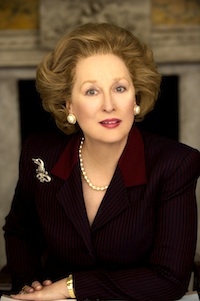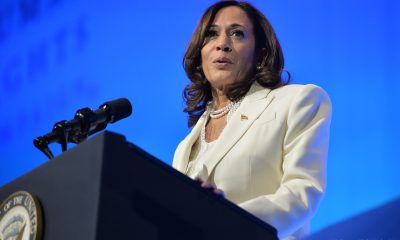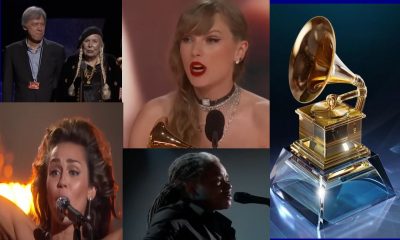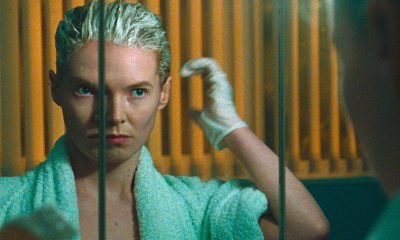Arts & Entertainment
Portrait of a ‘Lady’
Streep reliably good in new Thatcher biopic

In her latest cinematic turn, “The Iron Lady,” screen legend and two-time Academy Award winner Meryl Streep moves seamlessly into Number 10 Downing Street as iconic British Prime Minister Margaret Thatcher. From the opening scenes, she’s unrecognizable as a shaky, old Thatcher going out for milk — totally overlooked and unnoticed by former constituents.
The scene serves as foreshadowing for the flashback-fueled biopic about one of history’s more formidable females and how her haunted mind recalls the monumental events of her past and her struggle to stay firmly rooted in the present. The film opens today (Friday) in Washington; Landmark — both E Street and Bethesda Row — has it.
A lengthy knowledge of British politics isn’t required to thoroughly enjoy the film, which stirs empathy and respect for the tough and determined Prime Minister, but it can’t hurt. In her declining years, Thatcher relives her marriage to her husband (delightfully portrayed by Jim Broadbent), ascent to major political success and numerous battles against her male counterparts in Parliament. The format of using flashbacks to create a fluid, if not completely chronological, biopic is a tricky one. However, it works here because as Thatcher’s physical and mental decline are apparent, it’s logical that dementia, or at least a deep longing for her illustrious past, would play a role in her aging.
Unlike 2011’s uneven biopic “J. Edgar,” which was also told in a flashback format, “The Iron Lady” gives the feeling of a well-rounded and human portrait of a controversial leader. Even if one disagrees with Thatcher’s policies, the film inspires respect for the determined woman, who rose from a working middle-class background to be the first female Prime Minister of Briton.” J. Edgar,” followed a more traditional flashback format of a retiring official dictating an autobiography filled with embellishments. Late in the film the audience learns of the half-truths and is left with more questions and skepticism rather than any form of insight.
But forget the format. Forget the director. It is Streep who is the film’s anchor, mast and sail. While some critics have bemoaned the storyline and structure, all agree Streep is mesmerizing. There are few actors who could legitimately be compared to Meryl Streep and her performance in “The Iron Lady” is a perfect representation of why. She vanishes into Thatcher’s mannerisms, speech and aura. She never appears to acting or in costume and make up. The transformation of she undergoes is truly unbelievable. Her recent portrayal of Julia Child displayed once again her trademark ability to master speech patterns and accents, which she also nails in this film.
While Thatcher’s persona and impact were larger than life, Streep exercises perfect restraint in bringing the Prime Minister’s greatest moments to the screen. She keeps her teeth far enough away from the scenery as not to turn Maggie into “Mommie Dearest” when tensions rise. Thatcher is known for her outspoken personality and Streep does an impeccable job of conveying that without sacrificing authenticity.
When the final credits roll, the audience is left not with an ideological or chronological picture of a politician, but the snapshots of the life of someone who believed wholeheartedly in what she said and did. “The Iron Lady” leaves one with a curiosity to know more about Margaret Thatcher but not because the film is incomplete but because its subject is masterfully portrayed and presented. Political subject matter almost always proves divisive, but not “The Iron Lady.” A jumble of understanding, empathy and respect is what is created in the wake of the Prime Minister — even if her political views are not in concert with those of audience members.
As the days before the 84th annual Academy Award nominations are announced dwindle, Street is assuredly guaranteed her 18th nomination. Whether she or Viola Davis, who starred in 2011’s massively successful film “The Help,” will take home the top prize remains to be seen. But after seeing both films, one is inclined to believe that Meryl’s mantle might become a bit more crowded by another golden incarnation of Thatcher in February.
Theater
Swing actor Thomas Netter covers five principal parts in ‘Clue’
Unique role in National Theatre production requires lots of memorization

‘Clue: On Stage’
Jan. 27-Feb. 1
The National Theatre
1321 Pennsylvania Ave., N.W.
thenationaldc.com
Out actor Thomas Netter has been touring with “Clue” since it opened in Rochester, New York, in late October, and he’s soon settling into a week-long run at D.C.’s National Theatre.
Adapted by Sandy Rustin from the same-titled 1985 campy cult film, which in turn took its inspiration from the popular board game, “Clue” brings all the murder mystery mayhem to stage.
It’s 1954, the height of the Red Scare, and a half dozen shady characters are summoned to an isolated mansion by a blackmailer named Mr. Boddy where things go awry fairly fast. A fast-moving homage to the drawing room whodunit genre with lots of wordplay, slapstick, and farce, “Clue” gives the comedic actors a lot to do and the audience much to laugh at.
When Netter tells friends that he’s touring in “Clue,” they inevitably ask “Who are you playing and when can we see you in it?” His reply isn’t straightforward.
The New York-based actor explains, “In this production, I’m a swing. I never know who’ll I play or when I’ll go on. Almost at any time I can be called on to play a different part. I cover five roles, almost all of the men in the show.”
Unlike an understudy who typically learns one principal or supporting role and performs in the ensemble nightly, a swing learns any number of parts and waits quietly offstage throughout every performance just in case.
With 80 minutes of uninterrupted quick, clipped talk “Clue” can be tough for a swing. Still, Netter, 28, adds, “I’m loving it, and I’m working with a great cast. There’s no sort of “All About Eve” dynamic going on here.”
WASHINGTON BLADE: Learning multiple tracks has got to be terrifying.
THOMAS NETTER: Well, there certainly was a learning curve for me. I’ve understudied roles in musicals but I’ve never covered five principal parts in a play, and the sheer amount of memorization was daunting.
As soon as I got the script, I started learning lines character by character. I transformed my living room into the mansion’s study and hallway, and got on my feet as much as I could and began to get the parts into my body.
BLADE: During the tour, have you been called on to perform much?
NETTER: Luckily, everyone has been healthy. But I was called on in Pittsburgh where I did Wadsworth, the butler, and the following day did the cop speaking to the character that I was playing the day before.
BLADE: Do you dread getting that call?
NETTER: Can’t say I dread it, but there is that little bit of stage fright involved. Coming in, my goal was to know the tracks. After I’d done my homework and released myself from nervous energy, I could go out and perform and have fun. After all, I love to act.
“Clue” is an opportunity for me to live in the heads of five totally different archetype characters. As an actor that part is very exciting. In this comedy, depending on the part, some nights it’s kill and other nights be killed.
BLADE: Aside from the occasional nerves, would you swing again?
NETTER: Oh yeah, I feel I’m living out the dream of the little gay boy I once was. Traveling around getting a beat on different communities. If there’s a gay bar, I’m stopping by and meeting interesting and cool people.
BLADE: Speaking of that little gay boy, what drew him to theater?
NETTER: Grandma and mom were big movie musical fans, show likes “Singing in the Rain,” “Meet Me in St. Louis.” I have memories of my grandma dancing me around the house to “Shall We Dance?” from the “King and I” She put me in tap class at age four.
BLADE: What are your career highlights to date?
NETTER: Studying the Meisner techniqueat New York’sNeighborhood Playhouse for two years was definitely a highlight. Favorite parts would include the D’Ysquith family [all eight murder victims] in “A Gentleman’s Guide to Love & Murder,” and the monstrous Miss Trunchbull in “Matilda.”
BLADE: And looking forward?
NETTER: I’d really like the chance to play Finch or Frump in Frank Loesser’s musical comedy “How to Succeed in Business Without Really Trying.”
BLADE: In the meantime, you can find Netter backstage at the National waiting to hear those exhilarating words “You’re on!”
Movies
A ‘Battle’ we can’t avoid
Critical darling is part action thriller, part political allegory, part satire
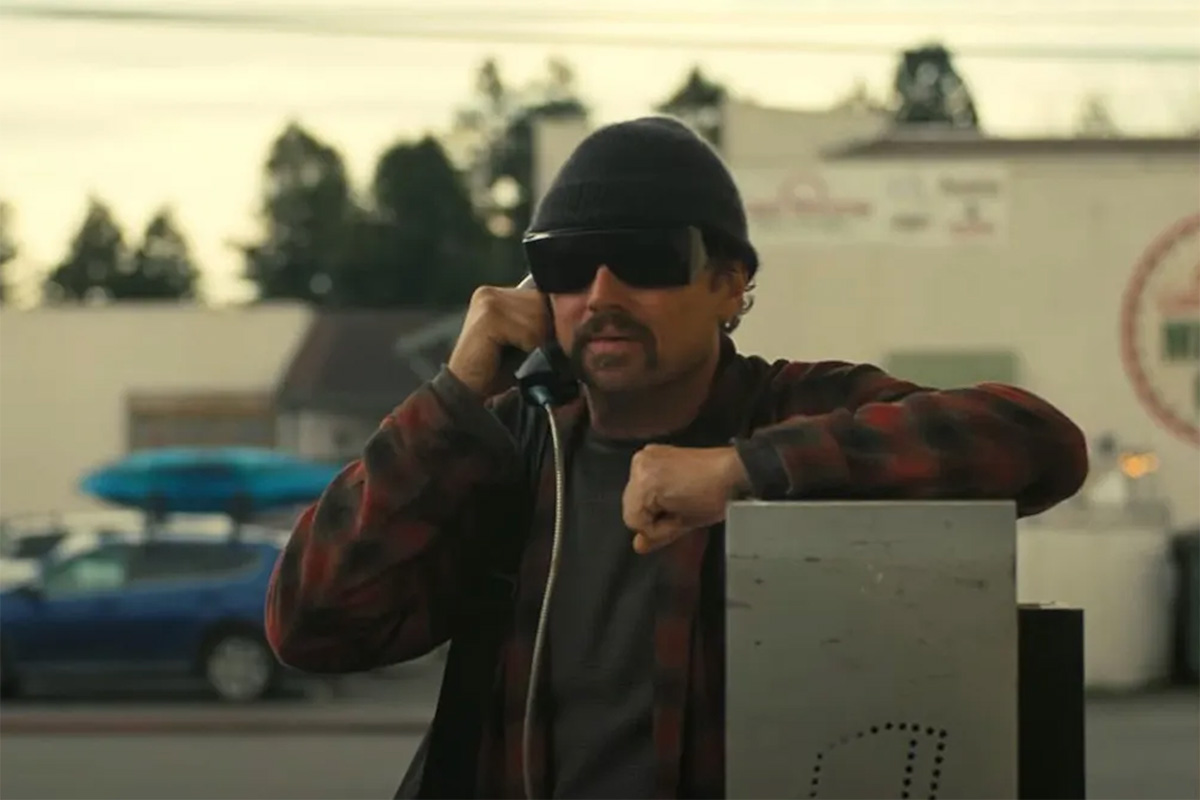
When Paul Thomas Anderson’s “One Battle After Another” debuted on American movie screens last September, it had a lot of things going for it: an acclaimed Hollywood auteur working with a cast that included three Oscar-winning actors, on an ambitious blockbuster with his biggest budget to date, and a $70 million advertising campaign to draw in the crowds. It was even released in IMAX.
It was still a box office disappointment, failing to achieve its “break-even” threshold before making the jump from big screen to small via VOD rentals and streaming on HBO Max. Whatever the reason – an ambivalence toward its stars, a lack of clarity around what it was about, divisive pushback from both progressive and conservative camps over perceived messaging, or a general sense of fatigue over real-world events that had pushed potential moviegoers to their saturation point for politically charged material – audiences failed to show up for it.
The story did not end there, of course; most critics, unconcerned with box office receipts, embraced Anderson’s grand-scale opus, and it’s now a top contender in this year’s awards race, already securing top prizes at the Golden Globe and Critics’ Choice Awards, nominated for a record number of SAG’s Actor Awards, and almost certain to be a front runner in multiple categories at the Academy Awards on March 15.
For cinema buffs who care about such things, that means the time has come: get over all those misgivings and hesitations, whatever reasons might be behind them, and see for yourself why it’s at the top of so many “Best Of” lists.
Adapted by Anderson from the 1990 Thomas Pynchon novel “Vineland,” “One Battle” is part action thriller, part political allegory, part jet-black satire, and – as the first feature film shot primarily in the “VistaVision” format since the early 1960s – all gloriously cinematic. It unspools a near-mythic saga of oppression, resistance, and family bonds, set in an authoritarian America of unspecified date, in which a former revolutionary (Leonardo DiCaprio) is attempting to raise his teenage daughter (Chase Infiniti) under the radar after her mother (Teyana Taylor) betrayed the movement and fled the country. Now living under a fake identity and consumed by paranoia and a weed habit, he has grown soft and unprepared when a corrupt military officer (Sean Penn) – who may be his daughter’s real biological father – tracks them down and apprehends her. Determined to rescue her, he reconnects with his old revolutionary network and enlists the aid of her karate teacher (Benicio Del Toro), embarking on a desperate rescue mission while her captor plots to erase all traces of his former “indiscretion” with her mother.
It’s a plot straight out of a mainstream action melodrama, top-heavy with opportunities for old-school action, sensationalistic violence, and epic car chases (all of which it delivers), but in the hands of Anderson – whose sensibilities always strike a provocative balance between introspection, nostalgia, and a sense of apt-but-irreverent destiny – it becomes much more intriguing than the generic tropes with which he invokes to cover his own absurdist leanings.
Indeed, it’s that absurdity which infuses “One Battle” with a bemusedly observational tone and emerges to distinguish it from the “action movie” format it uses to relay its narrative. From DiCaprio (whose performance highlights his subtle comedic gifts as much as his “serious” acting chops) as a bathrobe-clad underdog hero with shades of The Dude from the Coen Brothers’ “The Big Liebowski,” to the uncomfortably hilarious creepy secret society of financially elite white supremacists that lurks in the margins of the action, Anderson gives us plenty of satirical fodder to chuckle about, even if we cringe as we do it; like that masterpiece of too-close-to-home political comedy, Stanley Kubrick’s 1964 nuclear holocaust farce “Dr. Strangelove,” it offers us ridiculousness and buffoonery which rings so perfectly true in a terrifying reality that we can’t really laugh at it.
That, perhaps, is why Anderson’s film has had a hard time drawing viewers; though it’s based on a book from nearly four decades ago and it was conceived, written, and created well before our current political reality, the world it creates hits a little too close to home. It imagines a roughly contemporary America ruled by a draconian regime, where immigration enforcement, police, and the military all seem wrapped into one oppressive force, and where unapologetic racism dictates an entire ideology that works in the shadows to impose its twisted values on the world. When it was conceived and written, it must have felt like an exaggeration; now, watching the final product in 2026, it feels almost like an inevitability. Let’s face it, none of us wants to accept the reality of fascism imposing itself on our daily lives; a movie that forces us to confront it is, unfortunately, bound to feel like a downer. We get enough “doomscrolling” on social media; we can’t be faulted for not wanting more of it when we sit down to watch a movie.
In truth, however, “One Battle” is anything but a downer. Full of comedic flourish, it maintains a rigorous distance that makes it impossible to make snap judgments about its characters, and that makes all the difference – especially with characters like DiCaprio’s protective dad, whose behavior sometimes feels toxic from a certain point of view. And though it’s a movie which has no qualms about showing us terrifying things we would rather not see, it somehow comes off better in the end than it might have done by making everything feel safe.
“Safe” is something we are never allowed to feel in Anderson’s outlandish action adventure, even at an intellectual level; even if we can laugh at some of its over-the-top flourishes or find emotional (or ideological) satisfaction in the way things ultimately play out, we can’t walk away from it without feeling the dread that comes from recognizing the ugly truths behind its satirical absurdities. In the end, it’s all too real, too familiar, too dire for us not to be unsettled. After all, it’s only a movie, but the things it shows us are not far removed from the world outside our doors. Indeed, they’re getting closer every day.
Visually masterful, superbly performed, and flawlessly delivered by a cinematic master, it’s a movie that, like it or not, confronts us with the discomforting reality we face, and there’s nobody to save it from us but ourselves.
Sports
‘Heated Rivalry’ stars to participate in Olympic torch relay
Games to take place next month in Italy

“Heated Rivalry” stars Hudson Williams and Connor Storrie will participate in the Olympic torch relay ahead of the 2026 Winter Olympics that will take place next month in Italy.
HBO Max, which distributes “Heated Rivalry” in the U.S., made the announcement on Thursday in a press release.
The games will take place in Milan and Cortina from Feb. 6-22. The HBO Max announcement did not specifically say when Williams and Storrie will participate in the torch relay.

